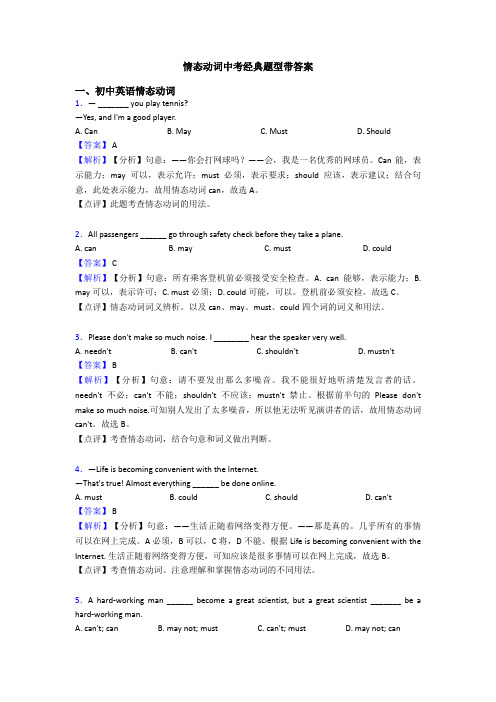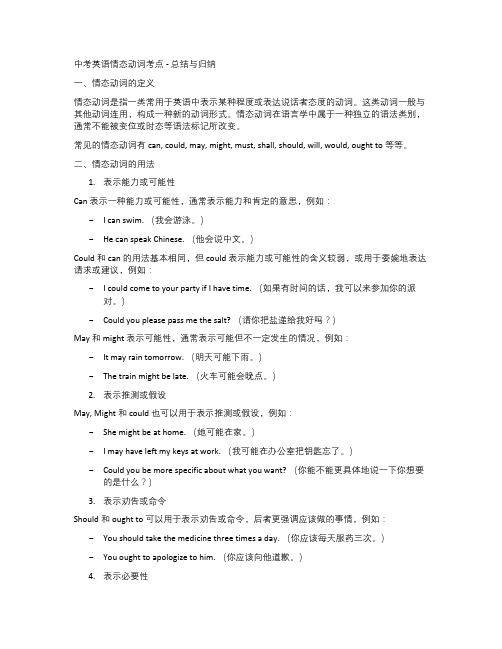中考考点十 情态动词
考点10 情态动词-备战2023年中考英语一轮复习考点帮(全国通用)(解析版)

考点10 情态动词情态动词是初中英语里的一个重要的语法项目,也是全国各省市中考试题的考查热点。
在备战2023年中考时,考生要牢记情态动词的结构和意义以及其表示推测时的用法,多做练习,在实践中加以区分。
1. 情态动词的意义;2. 情态动词的基本句型;3. 情态动词的基本用法。
情态动词的用法情态动词用法例句表示义务,职责时,意为"应当,应该",往往表示说话者的观点表示惊讶、遗憾等,意为"竟然,居然"need 表示"需要,必须",多用于疑问句和否定句Need you go so soon? 你需要这么早走吗?You needn’t come so early. 你不必来这么早。
【知识拓展】need的一般疑问句,肯定回答为Yes, ... must.;否定回答为No, ... needn’t.—Need he finish the article next week? 他需要下星期完成这篇文章吗?—Yes, he must. 是的,他必须完成。
/No , he needn’t. 不,他不需要。
have to 表示不得不,说明客观条件只能如此;有时态形式的变化;否定式don’t have to意为"不必"(=needn’t)My brother was very ill, so I had tocall the doctor in the midnight. 我弟弟病得厉害,我只得半夜里把医生请来。
I haven’t got any money with me, soI’ll have to borrow some from myfriend. 我身上没带钱,只好向朋友借点了。
(2022·四川遂宁·中考真题)—Whose physics book is this?—It ________ be Helen’s because her name is on it.A.mustn’t B.must C.might D.can’t【答案】B【详解】句意:——这是谁的图画书?——它一定是Helen的,因为她的名字在上面。
情态动词重点解析

情态动词重点解析,不可不知!情态动词是中考经常会考到的一个考点,但是很多孩子却弄不清每个情态动词的含义和用法,下面我就详细和大家来讲讲情态动词,建议各位家长把这篇文章分享给孩子看看。
情态动词是动词的一种,为了更深刻地理解情态动词,我们就得先把什么是动词搞清楚。
动词的核心是“动”字,“动”有运动、变化之意,所以动词是表达我们这个世界的运动和变化的。
但任何事物的运动和变化都是相对于静止状态的,所以动词还需要表达这种相对静止的状态。
这样,因为动词的含义从运动、变化又增加到状态,于是动词的种类就出来了。
表示运动和变化的动词就用实意动词,表示状态的就用系动词。
这两种动词表达是客观存有的动作,但假设这个动作和状态是说话人的主观意愿,就需要在这两种动词前加上表达主观意愿的词,也叫情态动词。
还有一种动词叫助动词,是为了区别实意动词和系动词,以及不同时间的动词。
由此,情态动词是表达主语的主观意愿的动作和状态的词,所以情态动词是不能自己独立使用的,不但自身没有人称和数的变化,后面的动词也都不能变化,都使用原形。
这就是情态动词的结构:不独立使用,后面的动词用原形。
我们来看组句子,总结一下这几个情态动词都是什么含义?1.Shecangotoschoolbyherself.她能自己去上学。
2.--CanyousinganEnglishsong?--No,Ican’t.你能唱一首英语歌曲吗?不,我不能。
3.There'ssomeoneknockingatthedoor.ItmustbeJim.有人敲门,肯定是Jim。
4.--MustIfinishtheprojecttoday?--No,youneedn't.我必须今天完成这个项目吗?不,你不必。
5.--MayIgonow?--No,youmustn't.我现在能够走吗?不,不允许。
6.Shemayloseherway.她可能迷路了。
7.Mayyousuccess!祝你成功!8.Youneedfinishyourhomework.你需要完成你的作业9.Youneedn'tcometoschoolsoearly.你不必这么早来学校。
中考英语情态动词用法总结

中考英语情态动词用法总结情态动词是英语中一种特殊的动词形式,用来表示说话人的情态和态度,以及表示可能性、能力、推测、请求、命令等。
以下是中考英语常见的情态动词及其用法总结:1. can/could-表示能力或允许做事- 例如:I can swim.(我会游泳。
)- 例如:Could I borrow your pen?(我可以借用你的钢笔吗?)2. may/might-表示可能性、许可或请求允许- 例如:It may rain tomorrow.(明天可能会下雨。
)- 例如:May I use the restroom?(我可以去洗手间吗?)3. must-表示必须或肯定性- 例如:You must finish your homework before going out.(你必须先做完作业才能出去。
)- 例如:He must be tired.(他一定很累。
)4. should-表示建议、义务或期望- 例如:You should eat more fruits and vegetables.(你应该多吃水果和蔬菜。
)- 例如:You should apologize for what you said.(你应该为你说的话道歉。
)5. would-表示愿意、习惯或请求礼貌- 例如:Would you like some tea?(你想要些茶吗?)- 例如:He would always help others.(他总是愿意帮助别人。
)6. will/would-表示将来时态或意愿- 例如:I will visit my grandparents next weekend.(下个周末我将去看望我的爷爷奶奶。
)- 例如:Would you like to join us for dinner?(你愿意和我们一起吃晚饭吗?)需要注意的是,情态动词本身不变化,没有人称和数的变化。
它们后面接原形动词,表示动作或状态。
情态动词中考经典题型带答案

情态动词中考经典题型带答案一、初中英语情态动词1.— _______ you play tennis?—Yes, and I'm a good player.A. CanB. MayC. MustD. Should【答案】 A【解析】【分析】句意:——你会打网球吗?——会,我是一名优秀的网球员。
Can能,表示能力;may可以,表示允许;must必须,表示要求;should应该,表示建议;结合句意,此处表示能力,故用情态动词can,故选A。
【点评】此题考查情态动词的用法。
2.All passengers ______ go through safety check before they take a plane.A. canB. mayC. mustD. could【答案】 C【解析】【分析】句意:所有乘客登机前必须接受安全检查。
A. can能够,表示能力;B. may可以,表示许可;C. must必须;D. could可能,可以。
登机前必须安检。
故选C。
【点评】情态动词词义辨析。
以及can、may、must、could四个词的词义和用法。
3.Please don't make so much noise. I ________ hear the speaker very well.A. needn'tB. can'tC. shouldn'tD. mustn't【答案】 B【解析】【分析】句意:请不要发出那么多噪音。
我不能很好地听清楚发言者的话。
needn't不必;can't不能;shouldn't不应该;mustn't禁止。
根据前半句的Please don't make so much noise.可知别人发出了太多噪音,所以他无法听见演讲者的话,故用情态动词can't。
故选B。
【点评】考查情态动词,结合句意和词义做出判断。
中考英语专题系动词、助动词情态动词复习

语法互动(十)┃系动词、助动词和情态动词
(2)could也可表示现在,用于婉转地提出请求、建议等,回 答时用can。 —Could you show me the way to the hospital? 你能告诉我去医院的路吗? —Of course I can.当然可以。 (3)can与be able to的区别 can只能用于一般现在时和一般过去时,而be able to可用于 任何时态。 He was able to flee to Europe before the war broke out. 战争 爆发前他成功地逃到了欧洲。
精品PPT
语法互动(十)┃系动词、助动词和情态动词
6.will和would的用法 will用于第二人称的疑问句时,表示征求意见或提建议。 would 为 will 的过去式,可用于多种人称,表示意愿。 Will you have a little soup? 你要不要喝点汤?
精品PPT
语法互动(十)┃系动词、助动词和情态动词
7.归纳:情态动词表推测的用法 (1)肯定句中一般用must(一定),may(可能),might/could(也 许,或许),其中must表推测的语气最强,其余依次减弱。 The book must be hers. Her name is on it. 这本书一定是她的,她的名字在上面。 He must be running.他一定在跑步。 They may know the way to the library. 他们可能知道去图书馆的路。
精品PPT
语法互动(十)┃系动词、助动词和情态动词
2.—He ________ be in the classroom, I think.
—No, he ________ be in the classroom. I saw him go
2020届中考英语语法备考专题10 情态动词(专项练习)(解析版)

中考英语语法备考秘籍—情态动词一基本用法1.(2018北京)I _________go now, or I'll miss my train.A . canB . mightC . mustD . could【答案】C【解析】考查情态动词的基本用法。
句意为:我___现在走,否则我会错过火车。
can能,会;might也许;must必须;could能。
结合语境可知此处为我必须现在走,否则会错过火车。
故选C。
2.(2018上海)——Must I do the project on my own?-No, you ________ . You can work with your classmates .A . needn'tB . can'tC . shouldn'tD . mustn't【答案】A【解析】考查情态动词的基本用法。
句意为“我必须自己做这个项目吗?”“不,你——,你可以和你的同学合作。
”用情态动词must来提问,否定回答时使用needn't。
故选A。
3.(2018安徽)——May I watch TV, Dad?-When your homework is finished , you _________ .A. shouldB. canC. mustD. need【答案】B【解析】考查情态动词的基本用法。
句意“爸爸,我可以看电视吗?”“当你完成了作业,你就——。
”should 应该;can可以;must必须;need需要。
根据句意可知此处表示许可。
故选B。
4.(2018重庆B卷)You ________stop when the traffic lights turn red.A. can'tB. mayC. mustD. needn't【答案】C【解析】考查情态动词的基本用法。
句意:当交通灯变红时,你——停下。
can't不能;may可能;must必须;needn't 不必。
中考英语情态动词考点总结与归纳

中考英语情态动词考点 - 总结与归纳一、情态动词的定义情态动词是指一类常用于英语中表示某种程度或表达说话者态度的动词。
这类动词一般与其他动词连用,构成一种新的动词形式。
情态动词在语言学中属于一种独立的语法类别,通常不能被变位或时态等语法标记所改变。
常见的情态动词有 can, could, may, might, must, shall, should, will, would, ought to 等等。
二、情态动词的用法1.表示能力或可能性Can 表示一种能力或可能性,通常表示能力和肯定的意思,例如:-I can swim. (我会游泳。
)-He can speak Chinese. (他会说中文。
)Could 和 can 的用法基本相同,但 could 表示能力或可能性的含义较弱,或用于委婉地表达请求或建议,例如:-I could come to your party if I have time. (如果有时间的话,我可以来参加你的派对。
)-Could you please pass me the salt? (请你把盐递给我好吗?)May 和 might 表示可能性,通常表示可能但不一定发生的情况,例如:-It may rain tomorrow. (明天可能下雨。
)-The train might be late. (火车可能会晚点。
)2.表示推测或假设May, Might 和 could 也可以用于表示推测或假设,例如:-She might be at home. (她可能在家。
)-I may have left my keys at work. (我可能在办公室把钥匙忘了。
)-Could you be more specific about what you want? (你能不能更具体地说一下你想要的是什么?)3.表示劝告或命令Should 和 ought to 可以用于表示劝告或命令,后者更强调应该做的事情,例如:-You should take the medicine three times a day. (你应该每天服药三次。
中考英语情态动词总结

中考英语情态动词总结情态动词是一类特殊的动词,表达了说话人的态度、意愿、能力、推测等情态。
常见的情态动词有can, could, may, might, must, shall, should, will, would, ought to等。
下面是关于这些情态动词的总结:1. can: 表示能力、许可。
常用于肯定句和疑问句中,一般不能用于否定句。
例如:"I can swim."(我会游泳。
)"Can you help me?"(你能帮我吗?)2. could: 表示过去的能力、许可,也可以用于请求或建议。
例如:"When I was young, I could run very fast."(我小时候跑得很快。
)"Could you please pass me the salt?"(你能帮我递一下盐吗?)4. might: 表示较小的可能性,常用于虚拟语气句中。
例如:"If it doesn't rain, we might go for a picnic."(如果不下雨,我们可能去野餐。
)5. must: 表示必须、推测的肯定。
例如:"You must finish your homework before you go out."(你必须在出去之前完成作业。
)"It's already 9 o'clock. He must be at home."(已经9点了,他一定在家。
)6. shall: 表示将来的意愿,用于第一人称(I, we)的疑问句中。
例如:"Shall we go to the park tomorrow?"(明天我们去公园吧?)7. should: 表示应该,常用于建议、请求中。
例如:"You should take a break."(你应该休息一下。
- 1、下载文档前请自行甄别文档内容的完整性,平台不提供额外的编辑、内容补充、找答案等附加服务。
- 2、"仅部分预览"的文档,不可在线预览部分如存在完整性等问题,可反馈申请退款(可完整预览的文档不适用该条件!)。
- 3、如文档侵犯您的权益,请联系客服反馈,我们会尽快为您处理(人工客服工作时间:9:00-18:30)。
中考考点十情态动词一.情态动词的用法1. can 用法1)表示能力,与be able to同义,但can只用于现在时和过去时,be able to可用于各种时态。
Two eyes can see more than one.注:Can you …? Yes, I can / No,I can’t.2).表示允许、请求用could比can 语气更加委婉客气,常用于could I /you …..?句型中,若表示同意时,用can回答而不用could .Could I borrow the book ? No, you can’t .3)。
表示推测“可能”常用于否定句或疑问句中。
(can’t表示一定不是)It can’t be true . Can it be true ?2. may 用法1)表允许,请求= can 表示许可或征求对方的许可,常于第一人称连用。
注:May I ….? Yes ,you may No, you can’t / mustn’t .在回答以may引起的问句时,多避免用这个词,而用其它方式,如Yes, please. / Certainly.2)表推测,可能、也许。
常用于肯定句中。
Maybe he knows the news .=He _____ _____ the news.3. must1)表示义务。
意为“必须”(主观意志)。
We must do everything step by step.注:Must I ….? Yes, you must / No,you needn’t(don’t have to ).--Must we hand in our exercise—books now? --No, you needn’t. / No, you don’t have to.2)mustn’t 表禁止、不允许。
You mustn’t talk to her like that.3)表示揣测。
意为“想必、准是、一定”等,只用于肯定句。
否定、疑问句中must改为can . He must be ill. He looks so pale. She’s wearing a diamond necklace. She must have a lot of money. 注:must表推测时,其反义疑问句与must后面的动词一致。
There must be something wrong ,____ ____?4.need的用法need既可用作情态动词,也可用作实义动词。
用作情态动词时,主要否定句或疑问句中。
用作实义动词时,可用于各种句式。
1).用作情态动词,用于否定句和疑问句中。
a).Need I ….? Yes , you must / No, you needn’t .Need we finish the work today ?Yes you __? A.need B.can C. may D.mustb).need + do sth . 变否定句:needn’t do sth变疑问句:Need sb do sth ?2).用作实义动词a).need + to do sth . We need _______(buy) some school things .变否定句:don’t /doesn’t /didn’t +need to do sth .变疑问句:Do / Does /Did sb + need to sth ?Yes , … do/ does / did No, sb don’t / doesn’t /didn’t .You don’t need to do it yourself.b).当主语是物时。
Sth + need + doing sth = Sth +need to be done .The table needs painting . =The table needs _____ _____ _____ .5.had better 的用法1). had better + 动词原形= It’s best to do sth .You had better ______ (stay )at home . = _____ ______ ______ stay at home .2). Had better not +动词原形We had better ________(not play ) the computer games .6.must 与have to1).一般情况下,两者可互换。
must = have to2).must “必须,应该”表示说话人的主观看法,即说话人认为必须干某事。
(内在原因)have to ―必须,不得不”强调客观需要,即外界因素迫使某人不得不干某事。
(外界原因)I can’t stop playing the computer games . For your health ,I’m afraid you ______.A.canB.mayC.mustD.had to二.情态动词后跟完成式和进行式的用法1.情态动词后跟完成式,表“原本应该干某事,而实际上没干”I should have finished the work earlier. He isn’t here. He must have missed the train.2. 情态动词后跟进行式,表示“想必正在……”,“可能正在……”,“应当正在”等意。
It’s twelve o’clock. They must be having lunch. They may be discussing this problem.He can’t be telling the truth. She shouldn’t be working like that. She’s still so weak.三.情态动词的同义转换.1.can = be able to2.must = have to3.needn’t = don’t have to4.need do sth = need to do sth .2013中考情态动词一网打尽(100%最新最全)1. —May I play computer games, Mom? —No, you ____________.A. don’tB. can’tC. wouldn’tD. won’t2. —Dad, must we wait until the light becomes green?—Yes, I'm afraid we______ .That's the traffic rule.A. canB. mayC. have toD. need3._ I see your ID card, sir? We have to check your information.A. MayB. MustC. ShouldD. Need4. Finish your homework first, then you’ll _______ watch TV for an hour.A. canB. be able toC. able D could5.—Amy, I hear you’ve got many foreign coins. ______ I have a look?—Of course, I’ll fetch them for you.A. MayB. MustC. ShouldD. Need6.— Where are you going this month?— We______ go to Xiamen, but we're not sure.A. needn’tB. mustC. mightD. mustn't7. —May I go out for a while, Mom?—No, you . You have to finish your homework first.A. shouldn'tB. needn'tC. mustn'tD. won't8.Students in our school ________ know shouting is not allowed in the library.A. canB. mayC. mustD. need9. —_______ I have lunch now, Mom? —No. You must wash your hands first.A. WouldB. MayC. NeedD. Must10.— Have you decided where to go for your summer vacation?—Not yet. We _______go to Qingdao . It's a good place for vacation.A. mayB. needC. mustD. can11. —Can I borrow your ruler,please?—Yes,you . But you must return it to me before lunchtime.A. haveB. canC. mustD. used to112.—Can I park my car in front of the building? —No, you ________.A. won'tB. can'tC. needn'tD. couldn't13.—Shall I take my swimming suit?—No, you . We will just go hiking in the mountain.A. mustn’tB. couldn’tC. needn’tD. can’t14. Drivers ________ wear seat belts while their cars are running on the road.A. needB. canC. mustD. may15.―Must I return the book this week?― No, you . You can it for 20 days.A. mustn’t, keepB. needn’t, borrowC. needn’t, keepD. mustn’t, borrow16. — Excuse me, whose book is this? —It ________ be John’s. It has his name on it.A. mustB. needC. can’tD. may17. —____I swim here? —No, you _____. Look at the sign ―No swimming‖.A. Must:can’tB. Can; don’tC. Can; mustn’tD. Must, mustn’t18. There is such a big noise that I ________ hear you very well.A.mustn’tB.needn’tC. shouldn’tD.can’t19. The man ______be my English teacher. He has gone to Canada.A. mightB. mustC. can’tD. may20. A country has dreams. We teenagers ________ also have dreams. With dreams and hard work, anything amazing can be created.A. mayB. mustC. shouldD. can21. According to the new traffic law, everyone in a car _______wear the seat belt.A. canB. mayC. mustD. will22. There's only one day to go. You _____finish your schoolwork by tomorrow.A. canB. willC. mustD. may23. —Who’s the man over there? Is it Mr. Black?—It ______ be him. He’s much taller.A. may notB. can’tC. will notD. mustn’t24. You mustn’t go off on your own, because you _______get lost in the mountains.A. shouldB. mustC. needD. might25.—Are you in a burry? —No, I’ve got plenty of time . I wait.A. canB. can’tC. mustD. mustn’t26. If you ______ go, at least wait until the rain stops.A. canB. mayC. mustD. will27. —_________ I help you, sir? —Yes. I want a T-shirt.A. CanB. ShouldC. MustD. Would28. —Oh, it's raining hard. —Be careful! The road be wet.A. couldB. mustC. mightD. can29. You ____________ drive your car so fast. It’s very dangerous.A. wouldn’tB. shouldn’tC. couldn’tD. mightn’t30. —Hello, Lisa. What's the matter? —I ______find my mobile phone. _______ you seen it?A.couldn't; DidB. can't; HaveC. need ; HadD. must; Are31. — Whose T-shirt is this? —It ________ be John’s. It’s ________ small for him.A. can’t; much tooB. can’t; too muchC. mustn’t; too muchD. mustn’t. much too32. My uncle ______ come back from Hong Kong to see me this weekend, but he hasn’t decided yet.A.mayB.canC.wouldD.must33. —__________ I come in? —Come in, please.A.NeedB.MustC.MayD. Should34. From March 23rd 2013, anyone under the age of 14 ________ go into Disney's US parks alone.A. couldn'tB. mustn'tC. needn'tD. mightn't35.—Li Lei, hurry up! The bus is coming.—Oh, no. We ______ cross the street until the traffic lights turn green.A. mustn’tB. may notC. needn’tD. have to36. —May I smoke here? —No, you _______. This is a no-smoking room.A. needn’tB. mustn’tC. couldn’tD. wouldn’t37. Excuse me, sir. You ______ open the door before the train stops.A. mustn'tB. needn’tC. may notD. don’t have to38. —Honey, stay home before I return. —I ________, mum.A. mustB. canC. willD. should39. — Look at the boy playing basketball on the ground. Is it George?—It ______ be him. He told me he would play basketball after class, but he’s not sure.A. mustn’tB. mustC. can’tD. may40. —Could you please tell me how to improve my spoken English? —Certainly, I __________.A.canB.couldC.mustD. should41. —Can I finish my homework tomorrow? —_________. You must finish it today.A.Yes, you canB.No, you needn’tC.No, you can’tD. Yes, you musn’t42. The British Museum is very serious.Visitors_______ keep quiet.A.mayB.mightC.canD.must43. —I answer this question in English?—No, you . You may answer it in Chinese.A. May; mustn’tB. Must; mustn’tC. Must; needn’tD. May; needn’t44. —_____I finish my homework now?—No, you_____. Your work is over today.A. Can't; mustB. Must; don't have toC. May; couldn'tD. Couldn't; could45. Hi, guy! You ________ not park your car here. It’s for our customers only.A. needB. mayC. willD. can46. A computer ______ think for itself. It’s always told to do things.A. mustn’tB. can’tC. shouldn’tD. shouldn’t47. In France you put bread on the table. You are not supposed to put it on the plate.A. shouldn’tB. are supposed toC. would like to D . will48. ----Where is my watch? I _______ find it. ----Don’t worry. It must be somewhere in your room.A. can’tB. mustn’tC. needn’tD. shouldn’t49. —Difficulties always go with me!—Cheer up! If God closes a door in front of you, there ______ be a window opened for you.A. wouldB. must D. could D. can50. —Two hundred yuan for such a T-shirt! You ______be joking! —I’m not joking. It’s made of s ilk.A. can’tB. canC. needD. must51. —Honey, how are you feeling now?—I am much better, Mum. So you ________ take me to see the doctor.A. can'tB. mustn'tC. needn'tD. couldn’t52. It’s rather hot in the room. You’d better _______ the windows or the door.A. closeB. not to closeC. don’t closeD. not close53. —How many English words do you think I should know?—As many as you ______. Then you will find reading quite easy.A. willB. mustC. canD. might54. — Can I hang out with my friends tonight, Mum?— Of course, but you ______ be home by 8:00 o’clock.A.canB.mustC. mayD. might55.--Pauline has lost her phone. –No. It’s in her bag. I _________ hear it.A. mustB. canC. mayD. shall2。
